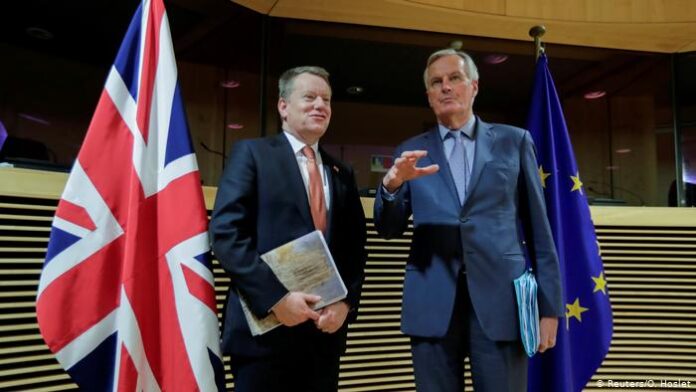Several rounds of talks on future trade and relations between the UK and the EU have taken place since the British departure from the bloc last January, with few significant signs of progress.
Even though negotiations have intensified over the summer, a breakthrough in the battle to reach a deal has remained elusive.
But although large differences remain on fundamental issues such as competition and fishing rights, both the UK and EU have shown willingness to compromise in some areas — leading to hope that a deal can be struck.
The standstill post-Brexit transition period which keeps most arrangements from the UK’s EU membership in place expires at the end of 2020.
This will bring major changes regardless of whether agreement on future trading and other relations is reached. But failure to strike a deal would magnify the challenges for business and the economy at a time when both sides are fully occupied fighting a war against the coronavirus pandemic.
The deadline in practice is the autumn to allow time for the ratification process by EU member states, a process that risks being longer and more complicated than it was for the Brexit divorce deal on the UK’s exit terms.
Convergence on the shape of a deal?
The EU’s chief negotiator Michel Barnier has been more upbeat in talking up the prospects for an agreement. He has reportedly told member state envoys that the UK has scaled down its ambitions and is seeking a “low-quality, low-profile agreement”.
The EU wants an overall, wide-ranging agreement in one comprehensive treaty, whereas the UK has been seeking a simpler free trade deal and separate agreement on other matters.
But after the fifth round of talks which took place in London, Barnier’s UK counterpart David Frost said in a statement that his side had “heard the EU’s concerns about a complex Switzerland-style set of agreements” and was “ready to consider simpler structures”, subject to agreement on dispute settlement and governance.
Barnier is also said to have repeated to envoys his belief, as stated in his assessment of the latest talks, that Boris Johnson’s government “want to find an agreement with the EU”.
No referee role for the ECJ?
David Frost said in his latest report that “the EU has listened to the UK on some of the issues most important to us, notably on the role of the (European) Court of Justice (ECJ)”.
The British side has consistently ruled out any jurisdiction for the ECJ over the UK’s laws, or in the prime minister’s words “any supranational control in any area”.
Brussels has previously said that if EU law needed to be interpreted, an arbitration panel should refer cases to the ECJ and follow its rulings.
The EU’s negotiator acknowledged in his latest assessment that “no role for the European Court of Justice in the UK” was the first of Johnson’s three red lines.
“We have tried to understand how these three red lines can be squared with our commitment to a comprehensive new partnership,” Michel Barnier said. “We made progress towards the objective of a comprehensive and single institutional framework, which must include robust enforcement mechanisms,” he added.
Progress on security cooperation
Future cooperation on policing and judicial matters was also singled out by Barnier as an area where “some progress” had been made after “good discussions”, although “divergences remain”.
Frost also said that both sides had “continued to deepen our understanding of each other’s constraints on law enforcement”.
Again, the EU’s scope for flexibility on the ECJ’s future role is thought to have helped bridge gaps.
Deadlock over level playing field and state aid
Despite the progress listed above, sticking points remain in crucial areas fundamental to any deal.
Ensuring fair competition — the so-called “level playing field” as enshrined in the divorce agreement’s Political Declaration” — is one of two such areas where Barnier says “no progress” has been made.
The EU negotiator accused the UK of refusing to commit to maintaining high standards and avoiding undercutting the EU in important areas such as climate, environment, labour or social law.
“On State aid… we have made no progress at all,” Barnier said, suggesting the UK wanted to use its future regulatory autonomy to “distort competition with us”.
Not for the first time, he said the UK had failed to provide “visibility” on its future regime to control domestic subsidies.
Fish fight continues as small industry punches big
Both sides agree that they are in a rut over fisheries, an industry of relatively small economic size but which is punching above its weight in terms of importance in the post-Brexit talks.
Barnier describes as “simply unacceptable” the UK demand for “near total exclusion of EU fishing vessels from UK waters”. The EU fully recognises the UK’s desire to be an independent coastal state, he adds, but “common stocks need to be managed jointly”.
For his part, Frost gives little indication the UK is ready to give ground on fishing, or over competition.
“We have always been clear that our principles in these areas are not simple negotiating positions but expressions of the reality that we will be a fully independent country at the end of the transition period,” he wrote after the last talks.

